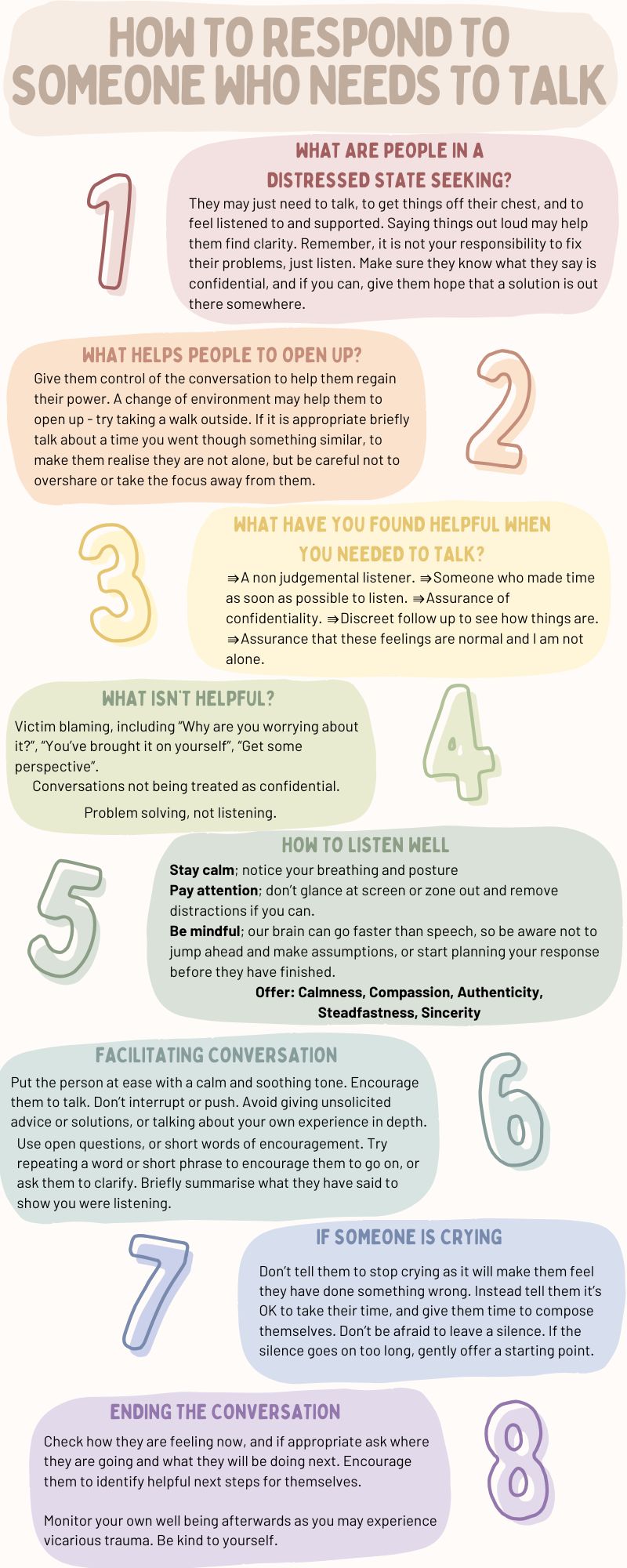Page published on 9th December 2024
Page last modified on
On 7 November IP Inclusive and Jonathan’s Voice marked Movember with a free webinar looking at helpful ideas and techniques for facilitating sensitive conversations, whether with a friend, family member or colleague. Often we are told we should talk, but responses may not be helpful or if someone opens up to us we worry about whether we have said the right thing. Dr Holly Redman, trainee patent attorney at Appleyard Lees, Simon Keevey-Kothari, an IP barrister and Senior Associate at Carpmaels & Ransford, and Barbara Lawton, of Jonathan’s Voice, shared these useful tips.

Alt Text:
Short description; the infographic above lists 8 top tips for having a conversation with someone in distress.
Long description;
How to respond to someone who needs to talk
- What are people in a distressed state seeking?
- They may just need to talk, to get things off their chest, and to feel listened to and supported. Saying things out loud may help them find clarity. Remember, it is not your responsibility to fix their problems, just listen. Make sure they know what they say is confidential, and if you can, give them hope that a solution is out there somewhere.
- What helps people to open up?
- Give them control of the conversation to help them regain their power. A change of environment may help them to open up – try taking a walk outside. If it is appropriate briefly talk about a time you went though something similar, to make them realise they are not alone, but be careful not to overshare or take the focus away from them.
- What have you found helpful when you needed to talk?
- A non judgemental listener.
- Someone who made time as soon as possible to listen.
- Assurance of confidentiality.
- Discreet follow up to see how things are.
- Assurance that these feelings are normal and I am not alone.
- What isn’t helpful?
- Victim blaming, including “Why are you worrying about it?”, “You’ve brought it on yourself”, “Get some perspective”.
- Conversations not being treated as confidential.
- Problem solving, not listening.
- How to listen well
- Stay calm; notice your breathing and posture
- Pay attention; don’t glance at screen or zone out and remove distractions if you can.
- Be mindful; our brain can go faster than speech, so be aware not to jump ahead and make assumptions, or start planning your response before they have finished.
- Offer: Calmness, Compassion, Authenticity, Steadfastness, Sincerity
- Facilitating Conversation
- Put the person at ease with a calm and soothing tone. Encourage them to talk. Don’t interrupt or push. Avoid giving unsolicited advice or solutions, or talking about your own experience in depth.
- Use open questions, or short words of encouragement. Try repeating a word or short phrase to encourage them to go on, or ask them to clarify. Briefly summarise what they have said to show you were listening.
- If someone is crying
- Don’t tell them to stop crying as it will make them feel they have done something wrong. Instead tell them it’s OK to take their time, and give them time to compose themselves. Don’t be afraid to leave a silence. If the silence goes on too long, gently offer a starting point.
- Ending the conversation
- Check how they are feeling now, and if appropriate ask where they are going and what they will be doing next. Encourage them to identify helpful next steps for themselves.
- Monitor your own wellbeing afterwards as you may experience vicarious trauma. Be kind to yourself.